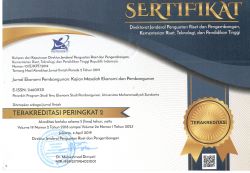Fiscal Capacity and Poverty Alleviation: A Panel Data Analysis for Yogyakarta Special Province, Indonesia
Jaka Sriyana(1*)(1) Universitas Islam Indonesia
(*) Corresponding Author
Abstract
Keywords
Full Text:
PDFReferences
Alkire, S., & Foster, J. 2008. Counting and multidimensional poverty. United Kingdom: Queen Elizabeth House, University of Oxford.
Atkinson, A. B., & Bourguignon, F. 1982. The comparison of multi-dimensioned distributions of economic status. Review of Economic Studies, 49, 183–201.
Baltagi, B. 2001. Econometric analysis of panel data (2nd ed.). England: John Wiley & Son.
Blank, R. M. 2008. How to improve poverty Measurement in the United Sates. Journal of Policy Analysis and Management, 27(2), 233–254. doi:10.1002/pam
BPS, D. I. Y. 2014. Yogyakarta special province in figures.
Chaudhry, I. S., Malik, S., & Hassan, A. 2009. The impact of socioeconomic and demographic variables on poverty : A village study. The Lahore Journal of Economics, 14(1), 39–68.
Duclos, J. Y., Sahn, D. E., & Younger, S. D. 2006. Robust multidimensional poverty comparisons. The Economic Journal, 116(514), 943–968.
Kis-Katos, K., & Sparrow, R. 2013. Poverty, labour markets and trade liberalization in Indonesia. In the institute for the study of labor discussion paper (pp. 1–32). Retrieved from http://www.econstor.eu/ handle/10419/90005
Mat-Zin, R. 2007. Poverty and inequality reduction in the ASEAN community: The need for political will. In the 32nd conference of federation of ASEAN economic association (pp. 1–31). Bangkok, Thailand.
McCulloch, N., Weisbrod, J., & Timmer, C. P. 2007. Pathways out of poverty during an economic crisis: an empirical assessment of rural Indonesia. In center for global development working paper (pp. 1–40). Retrieved from www.cgdev.org
Miranti, R., Vidyattama, Y., Hansnata, E., Cassells, R., & Duncan, A. 2013. Trends in poverty and inequality in decentralising Indonesia. In OECD social, employment and migration working Papers (pp. 1–115). OECD publishing. doi:10.1787/5k43bvt2dwjk-en
Qori’ah, C. G., Indrawati, Y., & Wardhono, A. 2010. Review of policy on poverty elimitation programme. In the 10th Indonesia Regional Science Association (IRSA) Conference (pp. 28–29). Surabaya, Indonesia.
Sobhan, R. 2002. Mainstreaming poverty eradiction: moving from micro to macro agenda. In centre for policy dialogue (pp. 1–24). Dhaka, Bangladesh.
Vijayakumar, S., & Brezinova, O. 2012. Poverty Incidence and its determinants in the estate sector of Sri Lanka. Journal of Competitiveness, 4(1), 44–55. doi:10.7441/joc.2012.01.04
Waglé, U. R. 2008. Multidimensional poverty: An alternative measurement approach for the United States? Social science research, 37(2), 559–580.
Wardhana, D. 2010. Multidimensional poverty dynamics in Indonesia (1993-2007). In Master Thesis. United Kingdom: The University of Nottingham. Retrieved from http://xa.yimg.com/kq/groups/18209593/10 93273342/name/Final+Draft+15092010++4094224.pdf
Wattanakuljarus, A. 2007. Is tourism growth pro-poor growth? In the 32nd conference of federation of ASEAN economic associations (FAEA)(Vol. 0, pp. 1–20). Bangkok, Thailand.
Wooldridge, J. 2003. Introductory econometrics: a modern approach. United States: Thompson.
Article Metrics
Abstract view(s): 871 time(s)PDF: 588 time(s)
Refbacks
- There are currently no refbacks.















